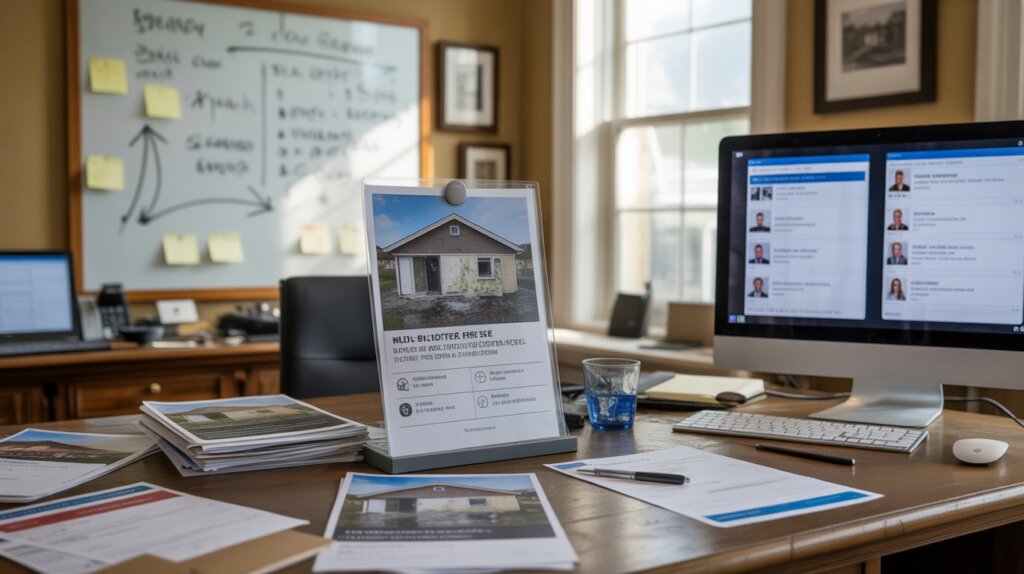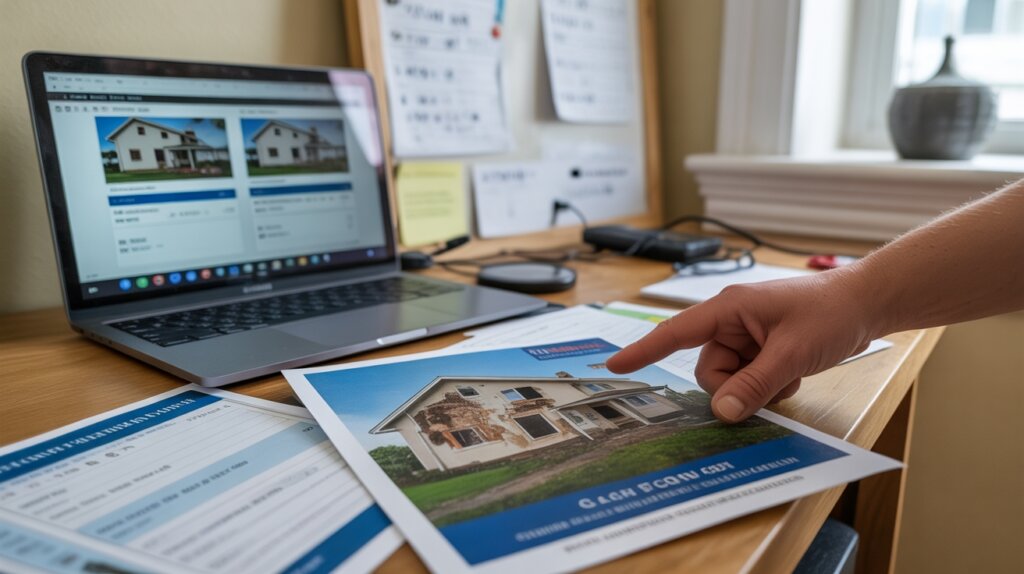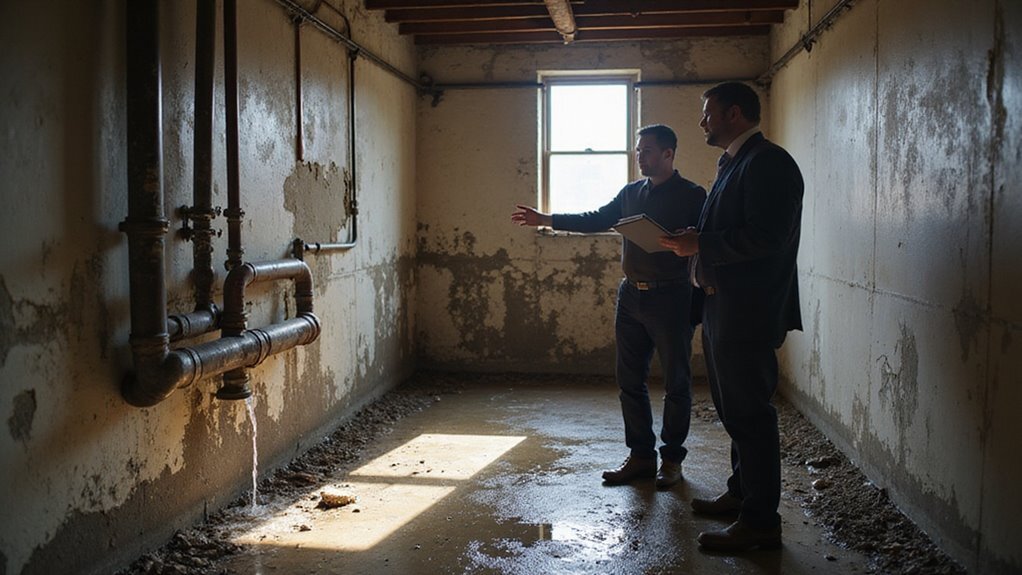Selling a house with mold or water damage is tough. Most buyers worry about repairs or health risks and walk away. This leaves many owners stuck with a home they cannot sell.
When a property sits unsold, costs pile up. Monthly payments, repairs, and stress can become overwhelming. The longer it stays on the market, the harder it is to find a buyer.
The best way to find cash buyers for a house with mold or water damage is to target real estate investors who specialize in distressed properties. They see potential where others see problems.
This approach can help you sell quickly and move forward. This blog will guide you step-by-step to find the right buyers and sell your damaged house fast.
Key Takeaways
- List your property on investor-focused platforms like Auction.com, Hubzu, or Roofstock, highlighting as-is condition and investment potential.
- Network with local real estate investment groups or attend investor meetups to connect directly with rehab-focused cash buyers.
- Use social media and targeted ads to promote the home to investor audiences, including honest details and visual evidence of the damage.
- Contact reputable “We Buy Houses” companies experienced in purchasing homes with mold or water damage for quick, cash offers.
- Work with real estate agents who specialize in distressed properties to access their network of qualified cash buyers.
Understanding Cash Buyers and Their Motivations

Cash buyers are people or companies who buy houses with cash instead of loans. They often look for homes with problems like mold or water damage. These buyers want to buy quickly and can close the deal in a few days. They usually have experience with as-is properties, understanding the current condition and potential repair costs. Most cash buyers are investors or real estate companies looking for a good deal.
Some are young buyers entering the market through investments. If a property has flaws, cash buyers may use this to negotiate a lower price. If you want to sell a house with problems, you should consider what cash buyers want. They are not looking for move-in-ready homes. If you target these buyers, you may sell faster and avoid long delays. Additionally, understanding market trends can help you time your sale when buyers are most active.
Assessing the Severity of Mold or Water Damage
You need to accurately identify how widespread the mold or water damage is before reaching out to cash buyers. Data shows that homes with clearly documented damage attract more serious offers, especially when you include a professional inspection report. Bringing in a certified inspector not only clarifies repair costs but also builds buyer confidence. Additionally, understanding the impact of mold on property value can help you better communicate the severity of the damage to potential buyers.
Identifying Damage Extent
Before selling to cash buyers, you must know how much mold or water damage your property has. An honest assessment helps buyers trust you. It also makes negotiations easier.
Start by checking for stains, warping, or musty smells in common areas. Inspect hidden spaces like basements, attics, or behind appliances for damage. If you see any issues, measure how far the damage has spread.
Take clear photos and write down what you find. Detailed records can support your claims during sale discussions. Accurate information helps set fair expectations for buyers.
Professional Inspection Importance
A professional inspection is important because it gives a clear and accurate report on mold or water damage. Certified inspectors use special tools to find hidden problems that you might miss. If you want to attract cash buyers, you need this level of detail.
A professional report lists the type and amount of mold found. It also explains any health risks caused by the damage. Buyers and investors rely on this information when making decisions.
Inspections provide written proof of damage, which helps with repair estimates and price talks. If you want to build trust with buyers, you should invest in a credible inspection. This shows honesty and makes your property more appealing, even if it needs repairs.
Pricing Your Home Competitively for As-Is Sale

Pricing your home competitively is important when selling as-is. Homes with mold or water damage usually attract investors, not regular buyers. A fair, data-based price will get more attention from serious buyers.
You should first look at recent sales of similar damaged homes in your area. If you compare these sales, you can avoid setting your price too high. Overpricing can turn away buyers who are paying cash.
Next, subtract the estimated repair costs from the after-repair value. If you do this, you will get a realistic starting point for your price. Investors will expect a lower price to cover repairs and make a profit.
You should also factor in an investor’s typical profit margin, which is usually between 10% and 20%. If you need to sell quickly, consider setting your price a bit lower. Lower prices can help you get faster offers from cash buyers.
Additionally, having a clear title can make your property more appealing and facilitate a quicker sale, especially when dealing with properties that require repairs. Properly addressing title issues can significantly impact the speed and success of your sale.
Preparing Essential Disclosure Documents
If you are selling your house as-is, you still need to complete required disclosure documents. Most states require you to inform buyers about any known problems, such as mold or water damage. These documents help you follow the law and build trust with cash buyers.
You should collect inspection reports, repair receipts, and any records from contractors. If you have fixed issues, include proof of the work. Accurate records show you are honest and committed to a fair sale.
It is important to use official state disclosure forms and fill them out with up-to-date facts. Detailed and truthful forms can protect you from legal problems later. Buyers may decide faster if you provide clear and complete information. Properly managing disclosure requirements and maintaining thorough documentation can also help ensure a smoother sale process, especially in probate situations. Being transparent about mold and water damage can also minimize potential legal disputes and buyer concerns.
Leveraging Local Real Estate Investors

Local real estate investors often buy homes with mold or water damage. They understand repair costs and can offer quick, cash deals. If you need a fast sale, investors are a smart option. Research shows that local investors buy over 35% of distressed properties. Improving your home’s curb appeal can help attract their attention. Even small clean-ups or basic staging can make a difference.
Networking at real estate events or seminars is another option. You can also contact local “We Buy Houses” companies. Using these channels increases your property’s exposure. Additionally, understanding the current Crestwood, KY real estate market trends can help you position your property more effectively to attract cash buyers. Building relationships with local investors can also lead to quicker sales and better offers.
Connecting With Real Estate Wholesalers
Connecting with real estate wholesalers helps you sell distressed properties quickly. Wholesalers have networks of buyers interested in homes with problems like mold or water damage. They know how to present your property’s issues as opportunities to investors. If you partner with a wholesaler, you benefit from their experience in estimating repair costs.
Wholesalers help set fair prices and clear expectations for both sellers and buyers. Their involvement can make the selling process faster and smoother. Understanding proper documentation and legal procedures also helps facilitate a smoother sale with wholesalers. Industry data shows wholesalers can cut your property’s market time by up to 50%. This method reduces delays and long negotiations. Working with cash home buyers is a proven option for a quicker sale.
Using Online Real Estate Marketplaces
Online real estate marketplaces help you find cash buyers for homes with mold or water damage. These websites connect you with investors who want distressed properties. If you want fast offers, using these platforms can save time.
Some websites, like Auction.com and Hubzu, focus on as-is and investor sales. You should choose these niche sites to reach serious buyers. If you use general real estate sites, you might get fewer investor leads.
Be clear about any mold or water damage in your listing. This honesty attracts buyers who are comfortable with repairs. If you hide problems, you may waste time on uninterested buyers.
Always research prices of similar homes in your area. Setting a fair price can attract more cash offers. If your price is too high, buyers may look elsewhere.
Respond quickly to questions from buyers on the platform. You can also join buyer groups and connect with investors directly. Fast communication can help you close a deal sooner.
Additionally, understanding the disclosure requirements for homes with known issues can help you present your property transparently and build trust with potential buyers. Being aware of market trends in distressed properties can also guide your pricing and marketing strategy effectively.
Promoting Your Property on Social Media
Social media helps you reach more buyers than traditional listings. It is especially useful for finding cash investors who want distressed homes. If you use Facebook, Instagram, and LinkedIn, you can target investor groups and people interested in fast, as-is sales. Using targeted social media campaigns can significantly increase your chances of connecting with serious buyers looking for distressed properties.
You can post before-and-after photos to show the home’s potential. Social media also lets you share honest details about mold or water damage. If you share your property in real estate investment groups, it may sell 30% faster than on listing sites alone.
Paid ads boost your property’s visibility and encourage quick responses. Facebook is best for investor groups and advertising. Instagram works well for staging photos and stories, while LinkedIn is good for reaching professional investors.
Twitter helps you share updates quickly using hashtags. YouTube is useful for virtual tours and simple educational videos. Using the right platform can help you connect with cash buyers who are interested in properties in distressed condition, allowing you to sell faster.
Contacting “We Buy Houses” Companies
Contacting “We Buy Houses” companies can help you sell a home with mold or water damage quickly. These companies buy houses in any condition, so you do not need to pay for repairs. Most sales close within two weeks, which can be helpful if you need to sell fast. We Buy Houses companies purchase homes with mold or water damage as-is, often closing sales in as little as two weeks.
Buyers should research each company before making contact. Reviews and business licenses can help you find a reliable company. If you find negative feedback, consider choosing another company.
Sellers should always tell buyers about any mold or water damage before the sale. Honest information can help you build trust and speed up the process. If you hide problems, buyers may offer less money or cancel the deal.
If you want the best offer, try to get quotes from several companies. Comparing offers will help you find the highest price. You can also ask about different closing dates and payment methods.
If you have special needs, discuss them before signing any agreement. Clear communication can help you avoid surprises later. Always read all documents carefully before you agree to sell.
Networking at Real Estate Investment Groups
You’ll increase your chances of finding cash buyers by attending local real estate investment groups, where over 70% of attendees actively seek distressed properties. Build relationships with investors who specialize in rehab projects, since they’re often equipped to handle mold or water damage. Share your property’s details directly—these connections can lead to quick offers and smoother closings.
Building Investor Relationships
Local real estate investment groups are a reliable way to find serious cash investors for problem properties. If you build relationships with local investors, you increase your chances of selling homes with mold or water damage. Data shows most investors prefer to buy from people they know and trust.
You should attend local meetings often to meet potential buyers. If you share helpful tips about mold and water damage, you show your expertise. Investors may be more interested if you explain how to stage distressed homes.
Sellers should also stay informed about legal rules for these properties. If you understand the law, you can offer deals that follow all requirements. This approach helps both you and the investor avoid problems.
Sharing Property Opportunities
Sharing property opportunities with investors at real estate group meetings helps you find serious buyers for homes needing repairs. If you share deals directly, you increase your chances of connecting with cash buyers. This is especially true for homes with mold or water damage.
Most investors find deals through personal connections. You should bring clear facts, like neighborhood data, recent sales, and repair costs. If you highlight possible returns, investors will pay more attention.
Be honest about the damage, repair costs, and local market trends. Investors look for clear, useful information. If you show your property as a smart investment, buyers will focus on value, not the repairs.
Networking with data-driven insights can help you reach the right buyers quickly. Strategic home staging can also make damaged homes more appealing. If you follow these steps, you improve your chances of a fast sale.
Advertising on Investor-Focused Platforms
Listing your house with mold or water damage on investor-focused platforms increases its visibility to cash buyers. Investors often search these sites for distressed properties. If you want to reach cash buyers, use these platforms.
You should highlight the home’s curb appeal and future value after repairs. Even with damage, good staging in photos can help buyers see the home’s potential. Honest descriptions and clear photos build buyer confidence.
If you list the property, choose high-traffic sites like Auction.com, Roofstock, or Craigslist’s investment property section. Keywords such as “investment opportunity,” “distressed,” or “fixer-upper” attract the right buyers. Quick responses to investor questions help build trust and speed up the sale.
Reaching Out to Home Flippers Directly
Home flippers often buy homes with mold or water damage. These buyers look for investment properties that others avoid. If you want to reach them, start by finding local flippers using public records, real estate auctions, or investor groups online.
You should highlight the property’s potential for better curb appeal. Mention how home staging can add value after repairs. Always provide inspection reports and repair estimates to show the full picture.
Flippers want accurate information and a direct approach. If you target these buyers, you may get quick, all-cash offers. This can help you sell faster and avoid long delays.
Working With Real Estate Agents Experienced in Distressed Properties
If you do not want to contact flippers yourself, you can work with a real estate agent. Agents who know distressed properties can make selling easier. They often sell homes with damage faster than other agents.
These agents have buyer lists with investors seeking fixer-uppers. They help you set a fair price based on repairs and inspections. If you want to sell quickly, an agent can market your home to the right buyers.
An experienced agent will guide you through all paperwork and disclosure rules. They make sure you follow environmental inspection laws. If you need help, an agent can reduce your stress and risk.
Screening and Qualifying Potential Cash Buyers
Screening and qualifying cash buyers helps you avoid wasted time and failed deals. Always check if the buyer can actually pay by asking for proof of funds. If they cannot show this, you should not move forward. Verify proof of funds before moving forward to ensure your cash buyer is serious and capable of closing the deal.
You should also ask about their experience with distressed properties. Buyers who know about mold or environmental problems are more likely to close. If they have handled repairs before, they will understand the costs and process.
Ask direct questions about their willingness to buy the property as-is. Buyers with a clear and fast process are usually more reliable. If a buyer hesitates, consider them less serious.
Use these checks to find buyers who are ready and able to purchase. Serious buyers respond quickly and share their experience. If a buyer cannot provide information, it is best to move on.
Conclusion
If you need to sell a house with mold or water damage, finding the right cash buyer is important. You should use honest disclosures, connect with local investors, and use real estate platforms. These steps can help you attract buyers who are ready to close quickly.
If you choose to work with companies that buy houses for cash, you can save time and avoid costly repairs. These buyers often accept properties in as-is condition and can offer a faster sale than traditional buyers. If you price the property competitively, you increase your chances of a successful transaction.
If you want a stress-free sale, we can help. At OC Real Estate, we buy houses for cash in any condition. Contact us today to get a fair, no-obligation offer for your property.

